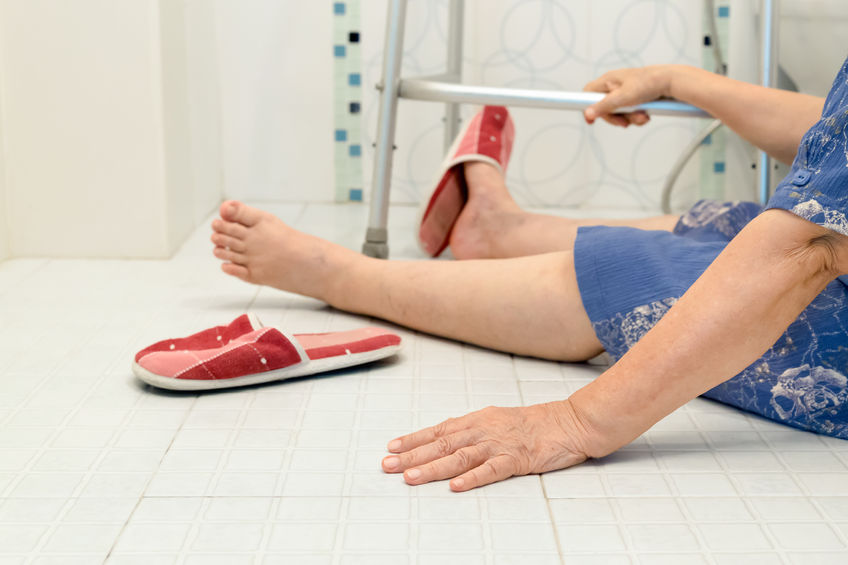
Maintaining Activity Lengthens Your Life
November 1, 2017
Alzheimers Disease – 10 Early Signs and Symptoms
January 2, 2018As many as 300,000 people, over the age of 65, experience a hip fracture each year. Without the once-strong bones, this can be a life-changing experience for most.
Why a Hip Fracture is so Threatening
According to the International Osteoporosis Foundation, less than 50% of those who suffer a fractured hip are ever able to regain their previous way of life. Decreased hip function takes away independent walking from an estimated 40% of those afflicted. Over 60% require aid with simple movements less than a year after the occurrence. This means that a large portion of seniors suffering from a hip fracture have to become dependent on constant care, like a nursing home.
What Causes Susceptibility to a Hip Fracture?
There are several reasons why hip bones are susceptible to fracture. These may include:
• Weakening from normal aging
• Blunt trauma
• Long-term obesity
• Disease like Osteoporosis
As one grows older, the density and strength in these bones begin to diminish. Add to this poor eyesight and poor balance and you have the making of a fall on a hard surface. Or something as simple as riding in a car can result in a hip fracture if you are involved in an accident that has heavy jarring. People that are overweight may experience weakness in hips, back and legs due to the constant pressure put upon them. And then there is Osteoporosis, the silent disease. You can have osteoporosis without even knowing it until a break occurs. The only way to be sure is by having a bone mineral density test performed by your physician.
Complications
Having strong bones in your younger years makes surgery to repair a broken hip easy enough. However, when age has debilitated this area, surgery is often not an option. There are certain risks that are attached to performing surgery. These can include:
• Unhealthy bones surrounding the break
• Blood clots that can form and travel
• Developing infection at the incision
It is up to the physician as to whether the physical condition, age of patient and severity of the break is worth the risk of trying to repair a hip fracture. The patient has to be strong enough to withstand general anesthesia or spinal anesthesia and the bones must be strong enough to support a metal plate and screws. If the patient is not well enough to endure a surgery procedure, they are forced to be confined to a chair or bed.
Without the ability to have a hip surgically repaired, there are many life-threatening medical issues that can develop. When there is a fracture in the hip, inflammation sets in. This creates good conditions for blood clots to form. In addition, being bed-fast increases muscle breakdown. It has also been noted that blood pressure can increase and cause heart disease to develop.
There are life-threatening medical issues that can transpire for the elderly regardless of hip fracture surgery or not. The most common of problems is the worsening of existing medical problems, new medical symptoms forming from inactivity and debilitating pain. Once a hip fracture occurs, an elderly patient is 6 times more likely to die in the hospital from the development of post-surgery complications, like a stroke, heart attack, or blood infection.
Getting Help for the Elderly
It takes a good rehabilitation program to help an elderly patient to recover from hip fractures. While a hospital can perform certain procedures, a specialized rehabilitation program is essential. Reducing pain and swelling is the first step in gaining back your freedom. The next step is increasing mobility and flexibility, followed by strengthening. It is often difficult to receive the personal treatment needed at a nursing home due to the numerous duties that they are required to perform. Be prepared by seeking the best, such as Sauk Prairie Physical Therapy located in Sauk City, Wisconsin. Their team of dedicated nurses and nursing assistants are available 24 hours a day to assist you and support you on the road to recovery.
Sources:
Hip Fractures Older Adults Centers for Disease Control and Prevention (2016, September) Retrieved January 3, 2018, from https://www.cdc.gov/homeandrecreationalsafety/falls/adulthipfx.html
Facts and Statistics, Hip Fracture, IOF, International Osteoporosis Foundation (2017) Retrieved January 3, 2018, from https://www.iofbonehealth.org/facts-statistics#category-16
Osteoporosis, Medline Plus, US National Library of Medicine (2017, November) Retrieved January 3, 2018, from https://medlineplus.gov/osteoporosis.html
Hip-Fracture Surgery Risk Not Just Due to Age, Newsmax Health (2015, September) Retrieved January 3, 2018, from https://www.newsmax.com/Health/Health-News/hip-fracture-surgery-risk/2015/09/15/id/691715/


